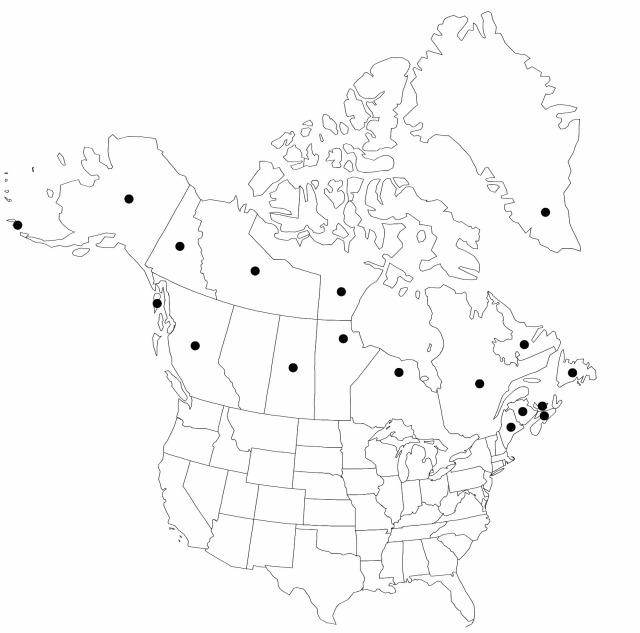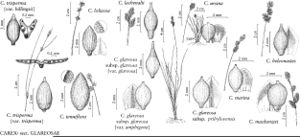Difference between revisions of "Carex mackenziei"
in V. L. Komarov et al., Fl. URSS 3: 183. 1935.
FNA>Volume Importer |
imported>Volume Importer |
||
| (6 intermediate revisions by 2 users not shown) | |||
| Line 1: | Line 1: | ||
{{Treatment/ID | {{Treatment/ID | ||
|accepted_name=Carex mackenziei | |accepted_name=Carex mackenziei | ||
| − | |accepted_authority=V. I. Kreczetowicz | + | |accepted_authority=V. I. Kreczetowicz |
|publications={{Treatment/Publication | |publications={{Treatment/Publication | ||
|title=in V. L. Komarov et al., Fl. URSS | |title=in V. L. Komarov et al., Fl. URSS | ||
| Line 8: | Line 8: | ||
}} | }} | ||
|common_names=Carex de Mackenzie | |common_names=Carex de Mackenzie | ||
| − | |basionyms={{Treatment/ID/ | + | |special_status={{Treatment/ID/Special_status |
| + | |code=F | ||
| + | |label=Illustrated | ||
| + | }} | ||
| + | |basionyms={{Treatment/ID/Basionym | ||
|name=Carex norvegica | |name=Carex norvegica | ||
|authority=Willdenow ex Schkuhr | |authority=Willdenow ex Schkuhr | ||
| + | |rank=species | ||
| + | |publication_title=Besch. Riedgräs. | ||
| + | |publication_place=1: 50, plate S, fig. 66. 1801, | ||
}} | }} | ||
|synonyms= | |synonyms= | ||
| Line 35: | Line 42: | ||
-->{{#Taxon: | -->{{#Taxon: | ||
name=Carex mackenziei | name=Carex mackenziei | ||
| − | + | |authority=V. I. Kreczetowicz | |
| − | |authority=V. I. Kreczetowicz | ||
|rank=species | |rank=species | ||
|parent rank=section | |parent rank=section | ||
| Line 49: | Line 55: | ||
|publication title=in V. L. Komarov et al., Fl. URSS | |publication title=in V. L. Komarov et al., Fl. URSS | ||
|publication year=1935 | |publication year=1935 | ||
| − | |special status= | + | |special status=Illustrated |
| − | |source xml=https:// | + | |source xml=https://bitbucket.org/aafc-mbb/fna-data-curation/src/2e0870ddd59836b60bcf96646a41e87ea5a5943a/coarse_grained_fna_xml/V23/V23_556.xml |
|genus=Carex | |genus=Carex | ||
|section=Carex sect. Glareosae | |section=Carex sect. Glareosae | ||
Latest revision as of 20:41, 5 November 2020
Plants loosely cespitose; rhizomes short; stolons present, often long. Culms sometimes curved, slender, 10–40 cm. Leaves: sheaths gray-brown to pale brown abaxially, inner band thin, hyaline, often red tinged, summit prolonged, concave; ligules as long as wide; blades yellowish green to pale gray-green, flat, 5–20 cm × 1–3 mm, subequal or shorter than culms, soft. Inflorescences 1.5–5 cm × 7–12 mm; proximal bracts scalelike, sometimes bristlelike, shorter than spikes. Spikes 3–6, gynecandrous, proximal spikes separate, usually 1–1.5 cm apart, distal approximate, individually distinct, containing 5–15(–20) perigynia, oblong, 5–15 × 4–6 mm; terminal spike conspicuously staminate at base, long-clavate, 10–20 mm. Pistillate scales pale red-brown with lighter center and narrow hyaline margins, ovate, ± equaling, concealing perigynia, apex obtuse. Perigynia appressed-ascending, gray-green, often reddish dotted, often pale brown in age, finely several-veined, oblong-elliptic, 2.5–3.3 × 1.5–2 mm, widest near middle, coriaceous; beak entire or with few marginal teeth. Achenes pale brown to gray-brown, oblong, 1.75–2 × 1.25–1.5 mm, dull. 2n = 64.
Phenology: Fruiting Jun–Aug.
Habitat: Coastal and estuarine marshes, mostly brackish soils, seashores
Elevation: 0–600 m
Distribution

Greenland, B.C., Man., N.B., Nfld. and Labr., N.W.T., N.S., Ont., P.E.I., Que., Sask., Yukon, Alaska, Maine, Europe, Asia.
Discussion
Selected References
None.
